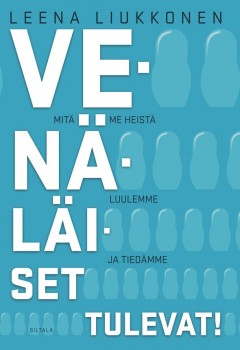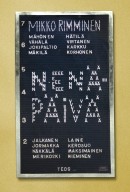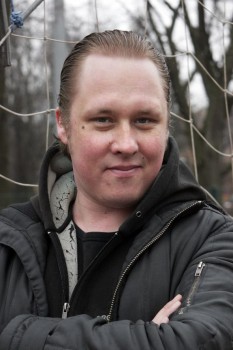Search results for "herbert lomas/www.booksfromfinland.fi/2004/09/no-need-to-go-anywhere"
The storm
From the collection of short stories Tvåsamhet (‘Two alone’, Söderströms, 2005). Introduction by Tiia Strandén
A storm blows up during the night. As he lies in bed, not yet asleep, just lingering on the brink of falling, in that soft yet sensitive state where sounds seem to grow and get bigger, he can hear the clattering, hissing sound of the wind coming up out there and sweeping up everything not fastened down, capable of being put in motion. It scrapes against the roof and window, loosens leaves and pine needles which scud across the ground, and it whistles and whines round the chimney and the windows, and it even beats against the shed door, which Dad must have forgotten to shut properly before he came in. Before he stamped the mud off his boots in the front hall. Before he had a chance to pull the front door shut firmly as well, because Joakim can hear how he brings the storm into the hall with him, and it sweeps through the kitchen faster than he ever could have imagined. Joakim shuts his eyes tighter, even though he is no longer really awake, and he hears the powerful gust flap past Dad, who is still standing with his hand on the door handle, and then Mum starts shouting because the wind is slamming into the furniture and making dishes crash to the floor and making pots and pans do the same. When Dad starts shouting as well, Joakim lets go of the last little bit of wakefulness and lets himself sink down into the cradle of dreams to be carried along until the morning. It is the sun that wakes him, or maybe the sound of the telephone, because he wakes up just as it rings, but in any case it has stopped blowing, and the branches of the big lilac bush outside the window are completely still. More…
What does the neighbour think?
26 April 2013 | Essays, Non-fiction
 For more than 20 years journalist Leena Liukkonen has been thoroughly involved with Russian culture, commerce, language and psyche. The subtitle of her new book of essays Venäläiset tulevat! (‘The Russians are coming!’) is ‘What we think and know about them’, and refers to the fact that the Finns do not really know their eastern neighbours very well. Liukkonen writes with insight about the differences in history, mentality and world view
For more than 20 years journalist Leena Liukkonen has been thoroughly involved with Russian culture, commerce, language and psyche. The subtitle of her new book of essays Venäläiset tulevat! (‘The Russians are coming!’) is ‘What we think and know about them’, and refers to the fact that the Finns do not really know their eastern neighbours very well. Liukkonen writes with insight about the differences in history, mentality and world view
Extracts (under original subtitles) from Venäläiset tulevat! Mitä me heistä luulemme ja tiedämme (Siltala, 2013)
WAR, REMEMBERING AND FORGETTING
In café conversations with other visitors to Russia, we often react with exasperation to the fact that discussions in Finland only ever start with the Winter War. Sometimes we wonder why the threshold between us and our neighbour to the east is still so high. My own living contact with the past, however, makes it clear to me that everything the elderly carry round with them could not have been simply shaken off with the passage of time. Nor can the next generation just break away from it. My own experience also reminds me how distant our eastern neighbour was during peacetime. After all, a very few have made the long journey to the country next door. To many people, the old story was the only story there was about Russia. More…
The search goes on
31 December 2007 | Archives online, Essays, On writing and not writing
The Finlandia Prize-winning author Kjell Westö recalls his literary adolescence, and the moment – of a dark January night – when he stopped worrying about writer’s block and began to write
When I was in my twenties, my urge to write was very strong. I was driven, almost consumed, by this ever-present zeal, which tore me apart nearly as inexorably and effectively as love did. But I wrote precious little. Now, some twenty years later, I have a general idea about the traps I so unknowingly walked into. More…
About us
8 January 2009 |
The Books from Finland online journal ceased operation on 1 July 2015, and no new articles will be published on the site.
A comprehensive online archive is available for readers to access. Brief extracts from Books from Finland may be quoted, provided that the source is cited.
If you wish to use longer extracts, please contact .

Books from Finland, an independent English-language literary journal, was aimed at readers interested in Finnish literature and culture. Its online archive constitutes a wide-ranging collection of Finnish writing in English: over 550 short pieces and extracts from longer works by Finnish authors were published from 1967 onwards.
Books from Finland featured classics as well as new writing, fiction and non-fiction, and other materials aimed at giving readers additional information on Finnish society and the wellsprings of Finnish literature. The target audience encompasses literary and publishing professionals, editors, journalists, translators, researchers, students, universities, Finns living abroad and everyone else with an interest in Finland and its literature.
Of course, publishing Finnish and Finland-Swedish literature in English requires skilled translators. Books from Finland’s editorial policy was always to use native English-speaking translators. In recent years David Hackston, Hildi Hawkins, Emily & Fleur Jeremiah, David McDuff, Lola Rogers, Neil Smith, Jill Timbers, Ruth Urbom and Owen Witesman translated for us.
Books from Finland was founded in 1967 and appeared in print format up to the end of 2008. From 2009 to 2015 it was an online publication. The journal’s archives have been fully digitised, and remaining issues will be made available in late 2015.
The Finnish Book Publishers’ Association (Suomen Kustannusyhdistys, SKY) began publishing the print edition of Books from Finland in 1967 with grant support from the Finnish Ministry of Education and Culture. In 1974 the Finnish Library Association (Suomen Kirjastoseura) took over as publisher until 1976, when it was succeeded by the Helsinki University Library, which remained as the journal’s publisher for the next 26 years. In 2003 publishing duties were handed over to the Finnish Literature Society (Suomalaisen Kirjallisuuden Seura, SKS) and its FILI division, which remained its home until 2015. The journal received financial assistance from the Finnish Ministry of Education and Culture throughout its 48 years of existence.
The editors-in-chief of Books from Finland were Prof. Kai Laitinen (1976–1989), journalist and critic Erkka Lehtola (1990–1995), author Jyrki Kiiskinen (1996–2000), author and journalist Kristina Carlson (2002–2006), and journalist and critic Soila Lehtonen (2007–2014), who had previously been deputy editor. The journal was designed by artist and graphic designer Erik Bruun from 1976 to 1989 and thereafter by a series of graphic designers: Ilkka Kärkkäinen (1990–1997), Jorma Hinkka (1998–2006) and Timo Numminen (2007–2008).
In 1976 Marja-Leena Rautalin, the director of the Finnish Literature Information Centre (now known as FILI), became deputy editor of Books from Finland. She was succeeded by Anna Kuismin (neé Makkonen), a literary scholar. Soila Lehtonen served as deputy editor from 1983 to 2006. Hildi Hawkins, who had been translating texts for the journal since the early 1980s, held the post of London editor from 1992 until 2015.
The editorial board of Books from Finland was chaired from 1976 to 2002 by chief librarian Esko Häkli, from 2004 to 2005 by the Secretaries-General the Finnish Literature Society, Jussi Nuorteva and Tuomas M.S. Lehtonen, and from 2006 to 2015 by Iris Schwanck, director of FILI. Members of the board included literary scholars, journalists, authors and publishers.
This history of Books from Finland was compiled by Soila Lehtonen, who served as the journal’s deputy editor from 1983 to 2006 and editor-in-chief from 2007 to 2014. English translation by Ruth Urbom.
Asko Sahlberg: He [They]
28 June 2010 | Mini reviews, Reviews
 He
He
[They]
Helsinki: WSOY, 2010. 120 p.
ISBN 978-0-36170-2
€ 24.10, hardback
The Finland-Swedish author Asko Sahlberg (born 1964), who lives in Gothenburg in Sweden, has had an interesting, if uneven, career over the past decade. Sahlberg’s particular strengths lie in his precise use of language and the rhythm of his prose. Since his debut novel, Pimeän ääni (‘The sound of darkness’, 2000), part of Sahlberg’s output has been concerned with meditations on existence and the purging of emotions, with the rest delving into historical themes, such as his 2004 novel Tammilehto (‘Oak Grove’) which is set in the year 1918, and He, his ninth book, which takes place in 1809. (An extract from his novel Eksyneet (‘The lost’) was published in Books from Finland, 2/2002.) In He Sahlberg uses a first-person narrative technique with multiple narrators, which feels justified in this highly distilled portrait of a family. The plot is set against the backdrop of the Finnish War (1808–1809), waged by King Gustav IV Adolf of Sweden and Alexander I, Emperor of Russia. Henrik and Erik are brothers fighting on opposite sides, their mother drowns her sorrows hard liquor, and Anna, the neighbour’s daughter, ends up with the wrong brother. The end of this novella is surprising, dealing with the anatomy of revenge and deceit.
The forest and us
30 June 2008 | Fiction, poetry
Poems from Kerttu ja Hannu (‘Gretel and Hansel’, Tammi, 2007). Introduction by Anselm Hollo
In the emptiness
When we were children. We went to sleep in our father’s and mother’s bed. I got father’s sweaty side. You got mother’s fragrant blankets. We dreamed pale green spherical cloud dreams in wrought-iron beds and burnt our fumbling paws on the red-hot shade of the night light. We did not know. That this downy softness wouldn’t last. The rooms were always large and the big people were big and there was no sin. More…
Mikko Rimminen: Nenäpäivä [Nose day]
29 October 2010 | Mini reviews, Reviews
 Nenäpäivä
Nenäpäivä
[Nose day]
Helsinki: Teos, 2010. 339 p.
ISBN 978-951-327-1
€ 25.90, hardback
Female protagonists as sympathetic as this are rare in contemporary literature; in this third novel by Mikko Rimminen (born 1975), Irma is a solitary, slightly awkward outsider who gets badly tangled up in a muddle of her own making. She poses as a door-to-door market researcher – in order to meet people. Rimminen employs a more complex plot than in his previous novels (his 2004 debut work, Pussikaljaromaani, ‘A six-pack novel’, about idle young men, has been translated into five languages). The author is an acknowledged master of the slow narration: he is skilled at describing the sound of silence and giving a page-long description of the behaviour of a mobile phone in someone’s hand. All that passes unsaid and unseen between people is cleverly and hilariously put into words. Rimminen’s Finnish is highly original – he keeps creating new verbs and compounds – and his characters who stand on the margins hankering after ordinary life gain the reader’s genuine sympathy.
1968
30 March 2005 | Fiction, Prose
A short story from Lugna favoriter (‘Quiet favourites’, Söderströms, 2004)
We were in the space age, the age that came and went, the age of space and great dreams, when space was what we talked about and space was what the papers wrote about, and about Vietnam and protests and revolution, in articles precocious and prematurely old children spelled their way through, children living in the mixed forests of the North which had recently been transformed into gleaming suburbs where ink-caps, puffballs and parasol mushrooms still grow in the backyards of high-rise tower blocks. It says in the paper that we humans will soon have to move away, leave the Earth because our planet has become overcrowded and almost uninhabitable, and space and the eternity of space are waiting for us and we have engineers of the highest class who will soon solve such small problems as still remain. It’s not a question of forests of mixed trees or ink-caps or parasol mushrooms or other earthly things, it’s a question of it being too late now, that we must go further, first to the moon and then to Mars and Andromeda and further still, and here are some of the key words and phrases: space programme, space race, Apollo, Vostok, Tereshkova and Glenn. For humanity has dreams, dark mixed visions and a nagging and not easily extinguished sense of life’s inscrutability and greatness, but down here all goes on as before, we kill each other, we kill our fellow men in jungles and marshes, we kill them amid rugged mountains and in snow-clad forests, we poison them and blow them to pieces, we kill them in dark backstreets and in ramshackle wooden hovels and in mighty marble palaces where the bath-taps glitter with gold. Only a chosen few are able to escape, and to do this they have to set off upwards into a coolness, and seek out a darkness and solitude where there will be no anxiety or feelings of guilt. But before they can get there they must face opposition of a magnitude that can only be overcome by a fierce rush of power, and before the rocket can start it sits and breathes out smoke and gases and fire for a good thirty seconds before lifting off slowly and reluctantly as if unwilling to leave its home planet, as if it hasn’t the slightest desire to go, but when it gets under way it travels at incomprehensible speeds over unimaginable distances, it’s only 108 years since Lenoir invented the internal combustion engine and we are already up in space where it’s silent and cool and peaceful, just a little anxiety in case some instrument fails, in case some double safeguard shows itself insufficient, otherwise nothing, just weightlessness and silence, just the oceans and deserts and mountain-chains on the surface of our blue globe. Though let’s be fair: the Chinese, who haven’t been up in space, claim that the Great Wall of China must be visible from up there, but on the other hand they have nothing to say about the visibility of new-built suburbs in the miserable little capitals of small underpopulated countries with frosty climates. More…
Transcript renewed
15 October 2009 | In the news
 Transcript, the redoubtable internet review of books and writing from around Europe, has a new editor. Francesca Rhydderch’s background as a former editor of the literary journal New Welsh Review will no doubt bring a fresh perspective on Transcript’s declared aim of promoting good literature written in the smaller European languages. Transcript offers wider circulation to material from small-language literary publications by translating them into English, French and German.
Transcript, the redoubtable internet review of books and writing from around Europe, has a new editor. Francesca Rhydderch’s background as a former editor of the literary journal New Welsh Review will no doubt bring a fresh perspective on Transcript’s declared aim of promoting good literature written in the smaller European languages. Transcript offers wider circulation to material from small-language literary publications by translating them into English, French and German.
Thirty issues of Transcript have been published since its inception in 2002. Now, taking a look at them again, we think they should have been dated – it is rather perplexing not to find any dates attached editorials or introductions to what is very contemporary fiction from an area that is in rapid flux. Perhaps the dates could be added now that new editions are to appear, after a longish break?
Transcript is published by Literature Across Frontiers, a European programme for literary exchange and policy debate, with the support of the Culture 2000 programme of the European Union; it operates in partnership with local literature networks.
The Finnish issue was published in 2004, edited by our very own Soila Lehtonen.
Finland(ia) of the present day
2 December 2010 | In the news

Mikko Rimminen. Photo: Heini Lehväslaiho
The Finlandia Prize for Fiction 2010, worth €30,000, was awarded on 2 December to Mikko Rimminen (born 1975) ; his novel Nenäpäivä (‘Nose day’, Teos) was selected by the cultural journalist and editor Minna Joenniemi from a shortlist of six.
Appointed by the Finnish Book Foundation, the prize jury (Marianne Bargum, former publishing director of Söderströms, researcher and writer Lari Kotilainen and communications consultant Kirsi Piha) shortlisted the following novels:
Joel Haahtela: Katoamispiste (‘Vanishing point’, Otava), Markus Nummi: Karkkipäivä (‘Candy day’, Otava), Riikka Pulkkinen: Totta (‘True’, Teos), Mikko Rimminen: Nenäpäivä (‘Nose day’, Teos), Alexandra Salmela: 27 eli kuolema tekee taiteilijan (’27 or death makes an artist’, Teos) and Erik Wahlström: Flugtämjaren (in Finnish translation, Kärpäsenkesyttäjä, ‘The fly tamer’, Schildts). Here’s the FILI – Finnish Literature Exchange link to the jury’s comments.
Joenniemi noted the shortlisted books all involve problems experienced by people of different ages. How to be a consenting adult? How do adults listen to children? Contemporary society has been pushing the age limits of ‘youth’ upwards so that, for example, what used to be known as middle age now feels quite young. And, for example, in Erik Wahlström’s Flugtämjaren (now also on the shortlist for the Nordic Literature Prize 2011) the aged, paralysed 19th-century author J.L. Runeberg appears full of hatred: being revered as Finland’s national poet didn’t make him particularly noble-minded.
According to Joenniemi, Rimminen’s novel ‘takes a stand gently’ in its portrayal of contemporary life – in a city where a lonely person’s longing for human contacts takes on tragicomical proportions. Joenniemi finds Rimminen’s language ‘uniquely overflowing’. Its humour poses itself against the prevailing negative attitude, turning black into something lighter.
Rimminen has earlier published two collections of poems and two novels (Pussikaljaromaani, ‘Sixpack novel’, 2004, and Pölkky, ‘The log’, 2007) . Pussikaljaromaani has been translated into Dutch, German, Latvian, Russian and Swedish.



